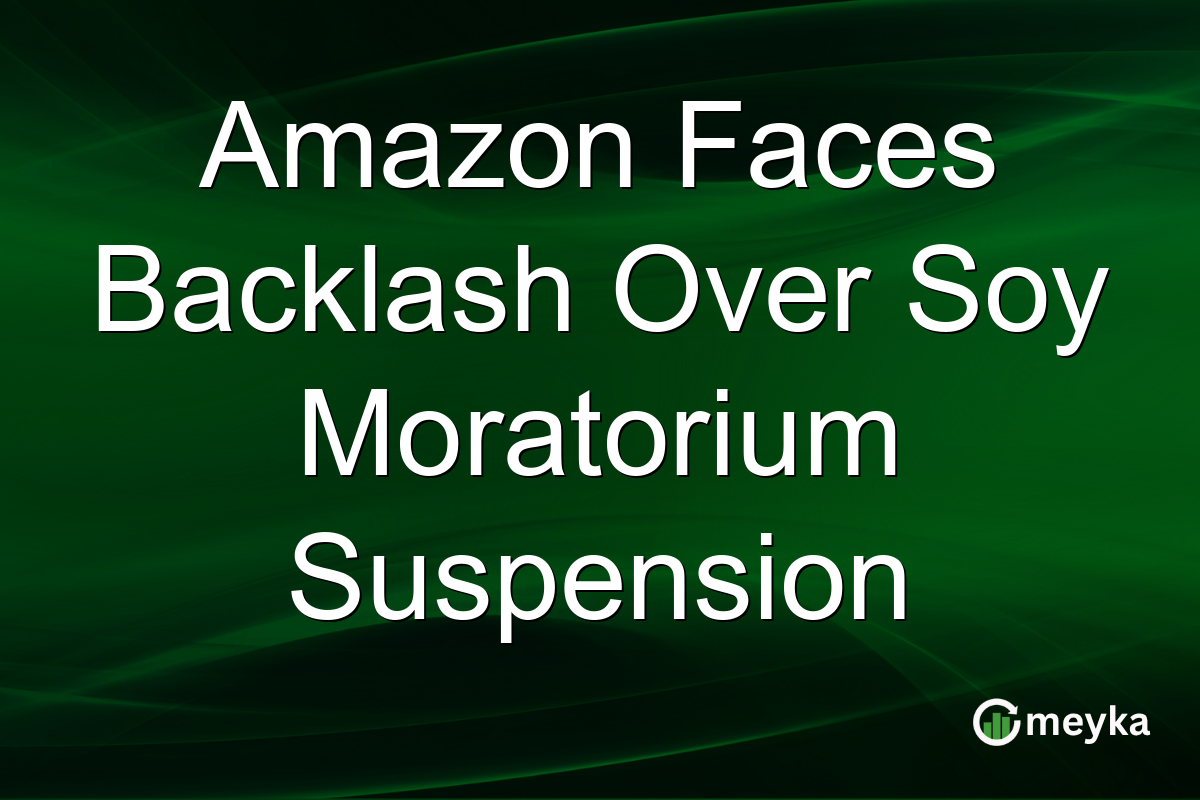Amazon Faces Backlash Over Soy Moratorium Suspension
Amazon has found itself at the center of a significant controversy. The company’s involvement in the suspension of Brazil’s Soy Moratorium has sparked criticism from major European food retailers. They are urging grain traders like Amazon to sustain this critical initiative to curb deforestation in the Amazon rainforest. Such environmental concerns are beginning to surface in market dynamics, prompting investors and consumers alike to scrutinize the potential ripple effects on global supply chains.
The Significance of the Soy Moratorium
The Soy Moratorium is a pivotal agreement aimed at reducing deforestation in the Amazon rainforest by prohibiting soy production on newly deforested land. Since its inception, the initiative has dramatically reduced deforestation rates, which soared in previous decades due to expanding agricultural activities. The moratorium plays an essential role not only in environmental conservation but also in maintaining ecological balances that affect agricultural yields worldwide. Suspending this moratorium could lead to increased deforestation, adversely impacting biodiversity and contributing to greenhouse gas emissions. Major food retailers in Europe have expressed their concerns, urging companies like Amazon to remain committed to environmental sustainability. With the global push towards eco-friendly practices, maintaining the moratorium could influence consumer loyalty and business operations within the agribusiness sector. Amazon’s involvement as a grain trader highlights the complexities businesses face in balancing profitability with corporate social responsibility. Maintaining environmental standards might prove favorable for Amazon’s reputation and align with its broader market strategy.
Implications for Amazon’s Market Performance
Amazon’s (AMZN) stock, currently priced at $232.33, witnessed a decrease of 1.42% recently, possibly reflecting investor concerns over this controversy. Being one of the largest companies worldwide, with a market cap of $2.48 trillion, Amazon’s strategic decisions significantly impact market perceptions. Its earnings announcement due on October 30, 2025, will likely address these environmental and operational challenges. Analysts hold a consensus target price of $245.30, suggesting a stable outlook, despite a few ongoing fluctuations. The company enjoys robust financial health, with a revenue growth of 10.99% and a return on equity of 23.84%. However, investors might express caution due to elements like deforestation impacts, possibly affecting long-term profitability. Maintaining strong environmental credentials often aligns with financial performance, making this moratorium a critical analysis point for stakeholders. Future financial growth remains promising, with three-year projections estimating substantial stock value increases upwards of $419.13. Thus, Amazon’s commitment to sustainable practices could merge with its growth trajectory, strengthening its industry standing while meeting investor expectations.
International and Environmental Repercussions
The potential suspension of the Soy Moratorium goes beyond environmental concerns, nudging international dialogue and policy-making. As a leader in consumer services on a global level, Amazon’s strategies typically influence broader industry practices. The international market increasingly favors players who demonstrate environmental responsibility. Deforestation’s impact extends to food security, climate change, and indirectly, to consumer markets. According to Reuters, continued deforestation could challenge food supply chains and contribute to global warming. Consequently, actions taken by large corporations, including Amazon, can shift public policies and consumer preferences positively or negatively. Furthermore, the industry’s supply chain intricacies imply that maintaining the moratorium aligns with reducing operational risks tied to unpredictable environmental changes. Thus, Amazon’s stance could influence its market position, prompting other industries to reflect upon integrating sustainable solutions within their operational frameworks.
Looking Forward: Strategies and Market Prospects
Amazon’s future actions concerning the soy moratorium will likely influence its strategic direction. The company prides itself on innovative solutions and responding swiftly to market’s changing demands, including those related to sustainability. For instance, maintaining technology-driven sustainability practices might enhance long-term investor confidence and align with growing global demand for eco-conscious products. Currently, Amazon’s financial metrics showcase resilience, with an EPS of 6.55 and a 35.47 P/E ratio, suggesting competitive strengths amidst market fluctuations. Despite a few setbacks, such as a recent 17% YTD stock decline, analysts recommend a ‘Buy’, bolstered by Amazon’s significant growth forecasts. Strategies cementing environmental responsibility could elevate Amazon’s market valuation and consumer loyalty. Partnering with global environmental campaigns or investing further in sustainable technologies might serve as prudent strategic moves. As the company navigates these challenges, the integration of such sustainable practices could prove pivotal for future profitability and market leadership.
Final Thoughts
Amazon’s position in global markets affords it the power to impact industry trends significantly. The recent debate over the suspension of the Soy Moratorium underscores this influence, highlighting the interconnectedness between environmental sustainability and market dynamics. As stakeholders and consumers become increasingly conscious of sustainable practices, Amazon’s strategic decisions in this regard could determine its future trajectory. Leveraging data, like that offered by Meyka, could be vital for investors seeking real-time insights on Amazon’s market movements. Staying ahead in the
FAQs
The Soy Moratorium is an agreement aimed at preventing soy production on newly deforested land in the Amazon rainforest, helping to reduce deforestation and protect biodiversity.
The suspension potentially raises investor concerns over sustainability issues, which could influence stock performance and market perceptions. However, analysts maintain a stable outlook for Amazon.
They fear that its suspension could lead to increased deforestation, impacting global supply chains, food security, and climate change efforts, thereby influencing business reputations and consumer choices.
Disclaimer:
This is for information only, not financial advice. Always do your research.






